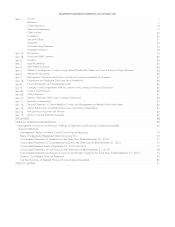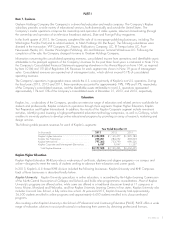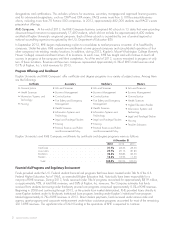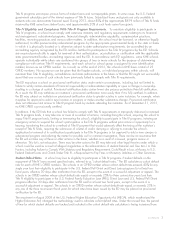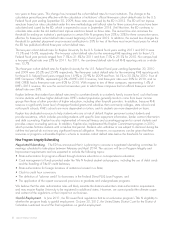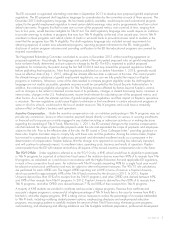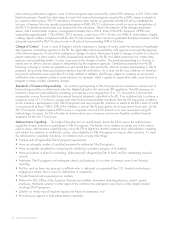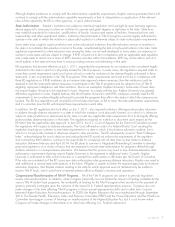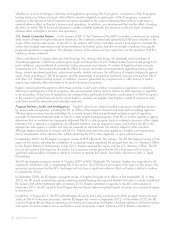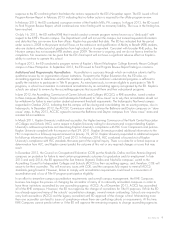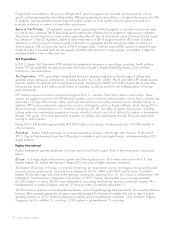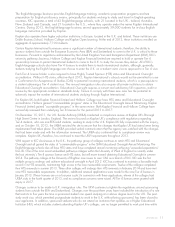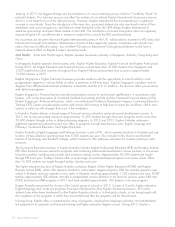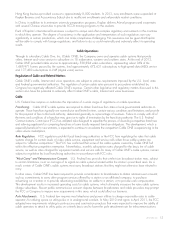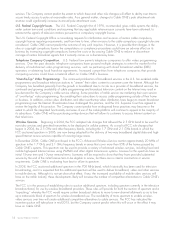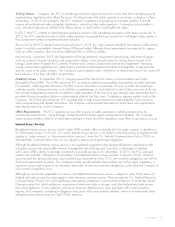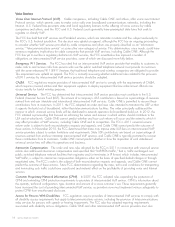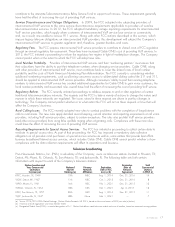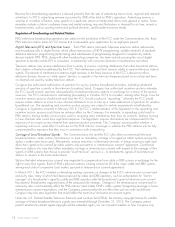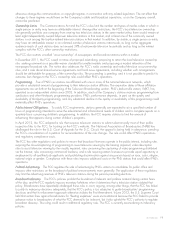Washington Post 2013 Annual Report Download - page 27
Download and view the complete annual report
Please find page 27 of the 2013 Washington Post annual report below. You can navigate through the pages in the report by either clicking on the pages listed below, or by using the keyword search tool below to find specific information within the annual report.response to the ED confirming that it had taken the actions requested in the ED’s November report. The ED issued a Final
Program Review Report in February 2013 indicating that no further action is required for the offsite program review.
In February 2013, the ED conducted a program review of the Franklin Mills, PA, campus. In August 2013, the ED issued
its Final Program Review Report, which contained one minor finding with no monetary liability. The issue in the finding has
been resolved.
On July 16, 2013, the ED notified KHE that it would conduct a remote program review known as a “desk audit” with
respect to the KHE’s Houston campus. The Department’s staff will not visit the campus, but instead requested information
and data that they can review from their offices. Kaplan has provided that data. The ED has indicated that the period
under review is 2008 to the present and will focus on the admission and qualification of Ability to Benefit (ATB) students,
who are students without proof of graduation from high school or its equivalent. Consistent with broader KHE policy, the
Houston campus has not accepted ATB students since 2009. The review is ongoing, and we do not have a timeline for
completion. No assurance can be given that the ED’s final report will not have a significant adverse effect on Kaplan’s
ability to continue to operate this school.
In August 2013, the ED conducted a program review of Kaplan’s Mount Washington College (formerly Hesser College)
campus in New Hampshire. In September 2013, the ED issued its Final Program Review Report finding no concerns.
Institutional and Programmatic Accreditation. Accreditation is a process through which an institution submits itself to
qualitative review by an organization of peer institutions. Pursuant to the Higher Education Act, the ED relies on
accrediting agencies to determine whether the academic quality of an institution’s educational programs is sufficient to
qualify the institution to participate in Title IV programs. As noted previously, to remain eligible to participate in Title IV
programs, a school must maintain its institutional accreditation by an accrediting agency recognized by the ED. Kaplan’s
schools are subject to reviews by the accrediting agencies that accredit them and their educational programs.
In June 2012, the Accrediting Commission of Career Schools and Colleges (ACCSC), a KHE accreditor, issued a notice
to three campuses (Baltimore, Dayton and Indianapolis Northwest) to “show cause” as to why their accreditation should not
be withdrawn for failure to meet certain student achievement threshold requirements. The Indianapolis Northwest campus
responded in October 2012, indicating that this campus will be closing and consolidating into an existing campus, also in
Indianapolis. In December 2012, the ACCSC Commission voted to continue the Baltimore and Dayton campuses on “show
cause” status. In May 2013, ACCSC agreed to remove the Baltimore and Dayton campuses from “show cause” status and
reinstate full accreditation.
In March 2011, Kaplan University’s institutional accreditor, the Higher Learning Commission of the North Central Association
of Colleges and Schools (HLC), sent a request to Kaplan University asking for documents and a report detailing Kaplan
University’s admissions practices and describing Kaplan University’s compliance with HLC Core Components and policies.
Kaplan University complied with this request on April 29, 2011. Kaplan University provided additional information to the
HLC in response to a follow-up request received on January 19, 2012. Kaplan University responded to additional requests
for follow-up information throughout 2012 and 2013. In February 2014, HLC conducted a focused visit of Kaplan
University’s compliance with HLC standards that were part of the original inquiry. There is no date for a formal response or
determination from HLC, and Kaplan cannot predict the outcome of this visit or any required changes or issues that may
result.
In December 2013, the Council on Occupational Education (COE) put the Nashville, Dallas and San Antonio (Ingram)
campuses on probation for failure to meet certain programmatic outcomes for graduation and/or employment. In late
2013 and early 2014, the ED approved the San Antonio (Ingram), Dallas and Nashville campuses’ switch to the
Accrediting Council for Independent Colleges and Schools (ACICS) as their accrediting agency, and, therefore, COE will
cease to be their accreditor. This will moot any issues with COE, and the campuses fully expect to meet all ACICS
standards going forward. However, failure to comply with accreditation requirements could result in a revocation of
accreditation and a loss of Title IV program participation eligibility.
In an effort to streamline campus accreditation requirements and overall campus management, the KHE Campuses
business has begun the process of changing the accreditor of many of its nationally accredited campuses in order to
have these institutions accredited by one accrediting agency, ACICS. As of December 2013, ACICS has accredited
all of the KHE campuses. However, the ED must approve the change of accreditors for Title IV purposes. While the ED
has already approved many of the schools’ accreditation changes, several remain outstanding. Schools are required to
carry both accreditors (ACICS and the legacy accreditor) until ED approval of the change is final. Maintaining more
than one accreditor can lead to issues of compliance where there are conflicting cohorts or requirements. At this time,
KHE Campuses cannot predict when or if the ED will approve the remaining requests to change accrediting agencies.
2013 FORM 10-K 9


